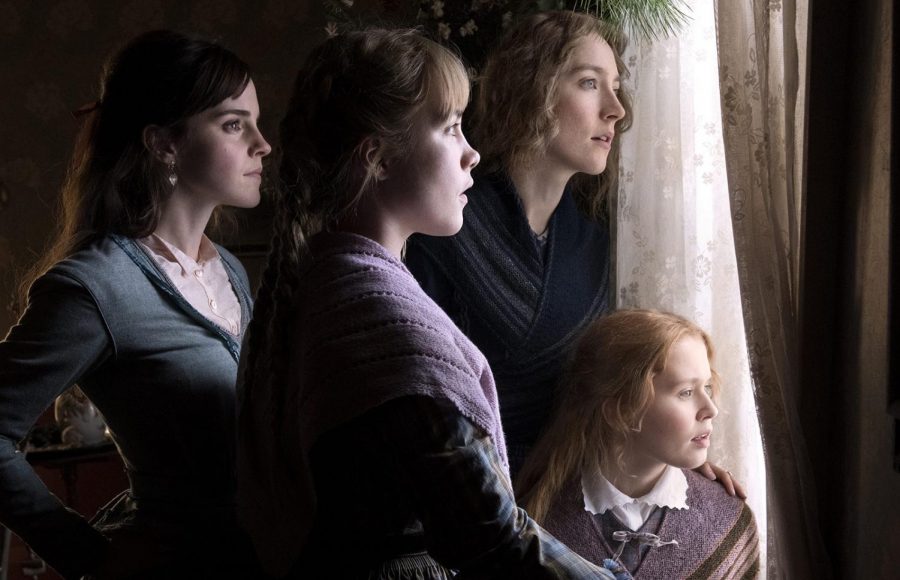Director Greta Gerwig proves there is no such thing as little women
“Little Women” (2019) successfully refreshes a classic storyline, finally expanding on the women’s complexities and showing us the true irony of the title.
January 17, 2020
In my 18 years of living, I have only cried over two movie trailers. Fun fact: this is two times more than the average person. The first time was for “Avengers: Endgame.” The second was just this summer for “Little Women” (2019). Those tears were fully validated that chilly New Year’s Eve Eve night by this beautiful reimagining of the 1868 classic.
I was beyond excited to see one of my favorite stories interpreted by some of my favorite actors, but I was also secretly afraid that this acting talent would be wasted in a shot-by-shot remake of the 1994 movie directed by Gillian Armstrong. I should have never doubted the genius of director Greta Gerwig. Please forgive me.
She fully delivered. “Little Women” (2019) rearranged the famous storyline of these four sisters into two hours and 15 minutes of flashbacks and flashforwards to expand on and deliver the full complexity of these female characters, who have always been far ahead of their time.
Exhibit A: we see Jo of the future in bustling New York, moving through crowds of people, with an (admittedly) unnecessary slow motion moment, but we don’t talk about that. The dreams she is so passionate about in the flashbacks have become a reality for her, but we still see her coming to terms with the reality of being a struggling female writer.
The structure of the movie refreshed this classic storyline using flashbacks spliced with the piercing scenes from the end of the narrative. I mean, Gerwig actually made us watch a scene of Beth’s terminal illness, then immediately sent us to her decorating for Meg’s wedding years earlier. And I have to love her for it because the contrast made the emotions so much more impactful, but she really roundhouse kicked me in the heart right then.
Not only did she restructure, but Gerwig also adjusted the script and storyline to demonstrate the women’s full complexities— a beautiful and subtle way of bringing this story into the 21st century.
This movie stayed true to Louisa May Alcott’s original story while inserting those modern feminist ideals which fully satisfied my need for a bit more complexity in the female characters. Jo’s internal struggle was shown much more honestly, and let her have moments where she wasn’t the impulsive girl who sold her hair for $25— she was given the liberty to cry, preach about women’s complexities, and admit how lonely she had made herself in pursuing what she thought was the right path.
To those who see this more modernistic approach as a betrayal to the original story, I raise them the word “adaptation.” To change with the environment one is in. The 1868 novel itself was ahead of its time. Undoubtedly this book upheld what could be considered as early feminist ideas such as women making their own financial way in the world and defying society’s expectations of “respectable women.” These ideas translated and interpreted for the 1994 movie adaptation. The 2019 version simply continued the trend. The beauty of a remake is that it launches a classic story back into popular culture, so that another generation can enjoy and learn from it. I think Gerwig’s work with this movie was exactly what the classic story needed in order to be successful in empowering women of today, just as Alcott’s novel did in its time.
Take Meg March, the oldest of the March sisters, portrayed by actress, activist and my personal hero, Emma Watson. Gerwig managed to portray the grueling struggle that Meg had with poverty her entire life. What Gerwig added to Meg’s want for material things and wealth was a realistic depiction of a journey of self discovery.
Meg gets over her disappointment with a life in poverty and in a moment of clarity, marries the poor tutor she was in love with. However, Gerwig includes a scene where Meg breaks, and buys expensive fabric while in town with one of her obscenely wealthy friends. We see her regret during a late-night conversation with her husband. As they sat together doing their books, tracking their finances, he comes upon her purchase. This is the first time this scene has hit the screen, and it elevates our understanding of a woman who could easily be seen as mercenary or shallow.
I give this movie five out of five stars for the creative and refreshing restructuring of this classic, the amazing cast and their talent to bring new life to these characters, and Gerwig’s interpretation which helped to realize the full potential of each March woman.
Gerwig showcased the irony of the title “Little Women” that I hadn’t noticed before. She pulled big stories from humble characters to create a modern feminist tale of a Civil War era family. This movie did the original novel justice as it creates a work of art that delivers the same message the novel did when it was released: there is no such thing as a little woman.




